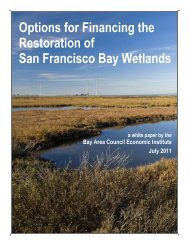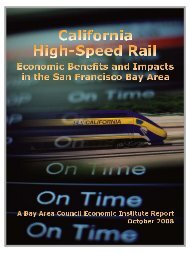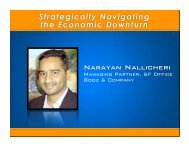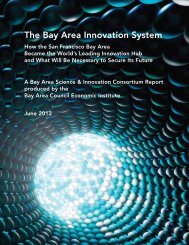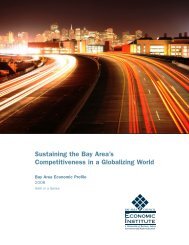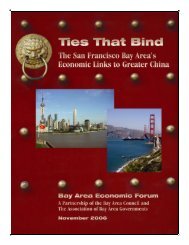PDF: 2962 pages, 5.2 MB - Bay Area Council Economic Institute
PDF: 2962 pages, 5.2 MB - Bay Area Council Economic Institute
PDF: 2962 pages, 5.2 MB - Bay Area Council Economic Institute
You also want an ePaper? Increase the reach of your titles
YUMPU automatically turns print PDFs into web optimized ePapers that Google loves.
Global Reach<br />
• the Satyajit Ray Film and Study Collection, containing a comprehensive collection of the<br />
director’s works;<br />
• the annual Siddhartha Maitra Memorial Lecture, which has featured prominent Indian<br />
intellectuals such as Nobel Laureate Amartya Sen and authors Vikram Seth and Pico Iyer.<br />
UCSC economics professor Nirvikar Singh also serves as director of UCSC’s South Asian<br />
Initiative, which until now has focused on the social sciences. Singh was central in coordinating<br />
and launching a 2008–09 colloquium series, “Mapping the Future of India,” in cooperation with<br />
the Indian Community Center. The series began with a May 2008 lecture by Shubhashis<br />
Gangopadhyay, adviser to India’s finance minister. Professor Singh works to enable UCSC<br />
faculty with expertise in South Asia to meet with counterparts in India.<br />
A longer-term goal is to establish an interdisciplinary South Asian Studies Center (SASC) in 2010<br />
that—in contrast to most South Asian studies centers that focus on language and culture—will<br />
primarily emphasize business and economic development (international finance, water management,<br />
agroecology, health care), and science and technological innovation (environmental science,<br />
climate change, engineering).<br />
In a separate Silicon Valley Initiative, UCSC is working to establish networks and collaborative<br />
arrangements with South Asian entrepreneurs in Silicon Valley, including TiE and other groups,<br />
and with business leaders in India.<br />
Professor Singh points to a range of programs and events on the UCSC campus that can be leveraged<br />
through better coordination under the auspices of a new SASC. For example, the Santa<br />
Cruz Center for International <strong>Economic</strong>s and the Center for Global, International and Regional<br />
Studies have held three successful conferences on the economies of India and China. The Center<br />
for Agroecology and Sustainable Food Systems, the Program in Community and Agroecology,<br />
and the Center for Integrated Water Research are positioned to study crop development, food<br />
production, and water policy. Faculty members in the Division of Physical and Biological Sciences<br />
are conducting research in areas critical to South Asia’s future, including arsenic pollution<br />
in groundwater, environmental pathogens such as cholera, and the effect of global climate<br />
change on environments and populations in low-lying coastal areas. And members of the Baskin<br />
School of Engineering faculty, particularly in Technology & Information Management (TIM),<br />
have been invited by California government agencies, Indian business and government leaders,<br />
the Indian <strong>Institute</strong> of Science (IISc), and the Indian <strong>Institute</strong>s of Technology (IIT) to participate<br />
in research and education initiatives.<br />
UCSC’s goals for the South Asian Studies Center are establishing faculty and professional networks<br />
in Santa Cruz, Silicon Valley and India; convening an advisory board; hiring an executive<br />
director; endowing six new faculty positions—two each in business and economic development,<br />
science and technological innovation, and arts, music, and culture (including language)—and, by<br />
2020, endowing $3 million in scholarships to attract foreign students.<br />
Within the California State University (CSU) system, only San Francisco State<br />
University (SFSU) reports data separately. SFSU had 73 Indian students on campus<br />
in 2007.<br />
62



